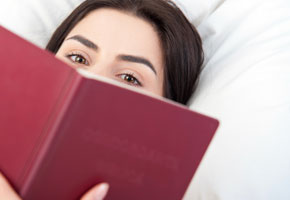
Tossing and turning? Try turning pages instead!
By Linda Bonvie | 0 Comments | Posted 01/21/2015
Sing this to the tune of “It don’t mean a thing if it ain’t got that swing.”
You won’t get to bed with that iPad shining at your head!
That’s what some new research is telling us about taking that iPad, smart phone, Kindle or other bright-light e-readers to bed with us for nighttime reading.
While this isn’t totally brand new information, it does shine a light on exactly why these readers are keeping us from getting quality shut-eye.
And it all has to do with our body’s production of a “sleep” hormone called melatonin.
You can easily zap your melatonin production, and a good night’s sleep, by exposure to the wrong kind of light. And the perfect place to find that “wrong” light is what shines on your eyes from computers, phones and certain kinds of e-readers.
Especially in those valuable melatonin-producing hours before bedtime.
Researchers in this study gave volunteers either an iPad or a paper book to read for several hours before bedtime.
And the iPad users suffered a significant drop in melatonin production – they had up to 50 percent less of the hormone than those volunteers given the “real” paper books to read. But what was even more surprising, was how long that melatonin production got delayed in the iPad users – by over an hour and a half.
Neuroscientist Anne-Marie Chang, the study’s lead author from Brigham and Women’s Hospital in Boston, called that delay very significant, resulting in less REM sleep and feeling sleepy the next morning, even if you’ve had a full 8 hours.
Dr. Chang said her team wasn’t sure if the melatonin delay was caused by the brightness of the screen or the fact that some devices emit “blue light,” which is a known zapper of melatonin.
So if you want to sleep more soundly, and not give yourself a case of light-induced jet lag, here are some tips:
- If you must use an e-reader in the hours before bedtime, use one that doesn’t emit light (such as the original and least expensive Kindle.)
- If you have an iPad or other bright kind, turn the brightness down as far as possible.
- Try reading a real book on occasion – the one with the paper pages you turn!
- The same melatonin-disrupting light comes from your computer and smart phone, too. So try to not use those devices in the hours before bedtime.
And also remember that too much bright and blue light exposure at night can make you stay up way past bedtime as the light can “mask the sleepiness that your body may be feeling,” said Dr. Chang.


 Contact us
Contact us



























